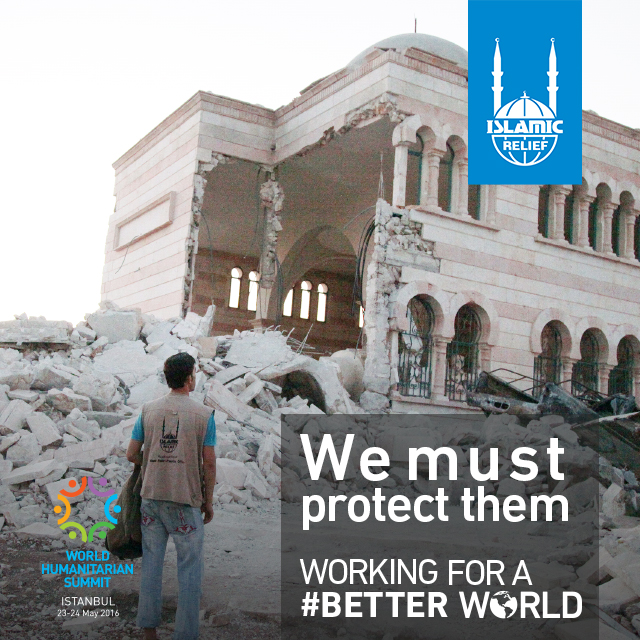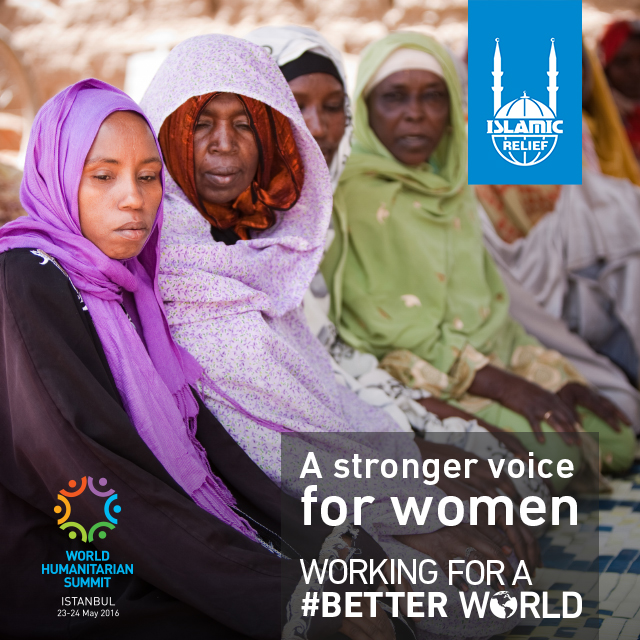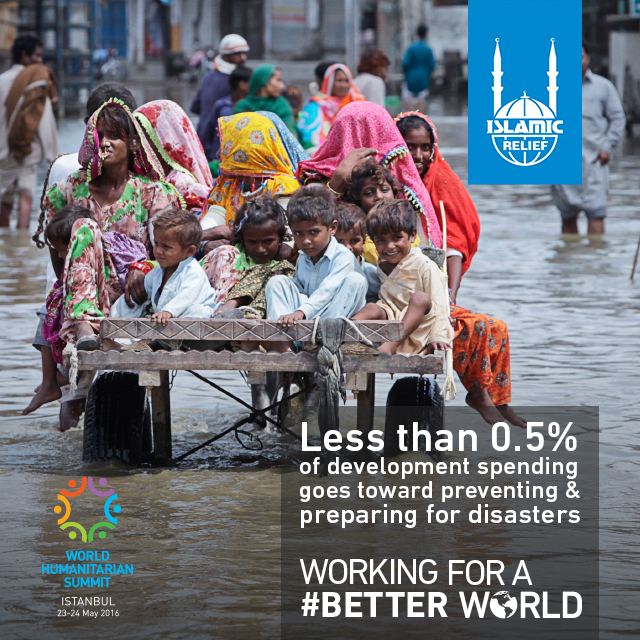What we want the summit to change and why
We asked nearly 1,000 people across 16 national consultations what they wanted to achieve at the World Humanitarian Summit.
These findings have shaped the key messages we are taking to the summit on May 23-24, putting people affected by natural and man-made disasters at the heart of humanitarian relief.
Find our responses to the five Core Responsibilities below.
Core responsibility one: political leadership to prevent and end conflicts
Conflicts are a major driver of humanitarian crises. Fourteen out of the 34 countries in which Islamic Relief operates are affected by active, violent conflict while another 18 risk escalation into crisis. As a humanitarian agency we play our part in delivering life-saving aid to communities trapped inside conflict zones, as well as those fleeing violence. We call on Member States at the WHS to play their part by investing more energy and resources in conflict prevention and peace processes.

Islam has within it a strong tradition of peacebuilding. Sadly this is poorly recognised within public discourse across the globe today. Our experience working with traditional dispute resolution systems in numerous countries has shown that working with religious traditions and practice involving faith communities is vital if we are to build their resilience to the escalation of conflict. We call on NGOs, Governments and the UN to take a more faith literate approach to conflict transformation and actively engage faith leaders and traditions at local and national levels in responding to humanitarian crises and peacebuilding.
Core responsibility two: uphold the norms that safeguard humanity
The humanitarian space is shrinking as adherence to International Humanitarian Law diminishes. Islamic Relief is deeply concerned by first-hand witness reports of both state and non-state actors indiscriminately bombing hospitals, schools and other civilian targets in conflict zones. We call on Member States at the WHS to fully recommit to International Humanitarian Law and agree to robust multilateral mechanisms for monitoring and accountability.

Islamic Relief is able to deliver lifesaving food and medical supplies to a number of besieged towns inside Syria and Yemen through our local partner organisations. We call on Governments and donors to do more to assist hard-to-reach communities in conflict affected states, by enhancing partnership mechanisms that support local organisations working in conflict hot spots, including re-examining the adverse impact of counter terrorism legislation on legitimate humanitarian agencies.
Core responsibility three: leave no one behind
Increasing numbers of forcibly displaced people are being denied their human rights as refugees by States, thereby forcing them to resort to irregular and unsafe transit options offered by people traffickers. In addition, the burden for hosting refugees is unfairly and disproportionately falling on poor and developing nations. We call on Member States to establish an international cooperation framework to equitably share the responsibility for hosting refugees and ensuring safe and legal avenues for all asylum seekers.

Core responsibility four: change people’s lives — from delivering aid to ending need
High mortality in humanitarian disasters disproportionately affects communities with high poverty indices. Supporting the resilience of local communities to adapt to increasing vulnerabilities caused by climate change, conflict and economic instability is therefore a key strategy in humanitarian effectiveness, yet only 0.4% of overall development assistance is spent on Disaster Risk Reduction (DRR). Islamic Relief has provided leadership on enabling agreement on an International Islamic Declaration on Climate Change in 2015 amongst Muslim states which has led to informed campaigning through faith leaders in their respective countries. Islamic Relief’s DRR programmes in places like Bangladesh, Philippines, Kenya and Pakistan work with existing community organising mechanisms and local governance structures to build long term capacity for disaster response and climate adaptation. This kind of work is grossly underfunded. We call on Member States to move beyond short term reactions to humanitarian crises – to invest in long term resilience building and disaster risk reduction as outlined by the UN Sustainable Development Goals.

Core responsibility five: invest in humanity
Humanitarian funding must be diversified if it is to meet the current demand of increasing numbers of protracted and complex crises. One area for innovation in financing is to better understand the potential of Islamic social finance. Islamic Relief member agencies annually raise approximately £20m through Zakat alone while globally the figure generated by the Muslim community is estimated to be at least $200bn (compared to a total global aid budget of $135.2bn). We see that a key area for innovation lies in recognising the potential of Islamic social finance, but that this must be done with due sensitivity. We call on Muslim Member States to develop transparent and effective practice in relation to mobilising this enormous potential resource to tackle poverty and transform lives.
For Islamic Relief media interviews and enquires at the World Humanitarian Summit contact Mohammad Shakir on +447747022590 or [email protected]










